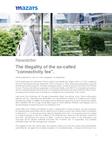
The illegality of the so-called "connectivity fee".
A few weeks ago, the collection of the so-called "connectivity tax" began, which is a "tax" created by the Civil Aeronautics through Resolution 2251 of August 3, 2016, that taxes passengers using the José María Córdova Airport in Rionegro as departure port, in order to finance the works of the Oriente Tunnel. The fee is $5,000 per passenger on domestic flights, and US$1.5 for international travelers, which is collected directly by the airlines. It is expected that this tax will raise $120,000 million, which, according to the Government of Antioquia, is needed for the construction of the tunnel.
Last month, the Colombian Air Transport Association (Atac), the airlines' union, filed a nullity action against such tax, requesting the declaration of a precautionary measure to suspend such charge, considering it illegal. In addition to the legal and constitutional arguments, to which we will refer below, Atac indicates that this charge would discourage air traffic between Medellin and Bogota, since it would artificially increase the price of air tickets by 10%.
Article 338 of our Political Constitution is clear in stating that "in times of peace, only the Congress, the departmental assemblies and the district and municipal councils may impose fiscal or parafiscal contributions (...)". In this sense, being clear the illegality of this "tax", it is surprising how it is insisted on simply by playing on the time it takes for the precautionary measure to be decreed, a period of time that - according to the Council of State - could very well be years. In the interregnum, the resources will be illegally collected and when this ill-named "tax" is suspended, very probably $120,000 million will have already been collected.
The illegality of this "tax" being clear, the question arises as to why the airlines and administrative authorities do not apply the so-called exception of unconstitutionality, a measure enshrined in our legal system that allows that when a regulatory provision is contrary to the Political Constitution, such regulation should not be applied as a measure of direct protection of the National Constitution.
This is not only a right of the legal operators, but also a duty, being able to be demanded by the affected parties, via tutela, in case its non-application violates fundamental rights.
This action not only generates an antijuridical damage for those who use the airport public services due to the imposition of an illegal tax but also generates damage in the market, since Resolution 00159 of January 18, 2017 imposes the burden on private airlines to collect a "tax" that is not charged at the Enrique Olaya Herrera Airport (alternate airport of Medellin) where the airline Satena (airline belonging to the State) covers the Medellin-Bogota route, as well as several other national routes. As a result, the national airlines were charged an illegal tax imposed by the Aerocivil, which not only harms them but also imposes the diversion of their clientele to the state airline, which is their direct competitor.
Just as taxpayers must act in good faith and in accordance with the law, so must the State and public entities.


